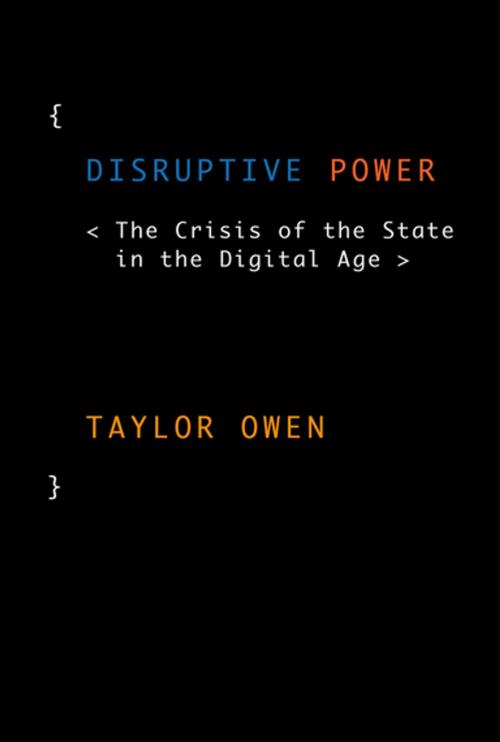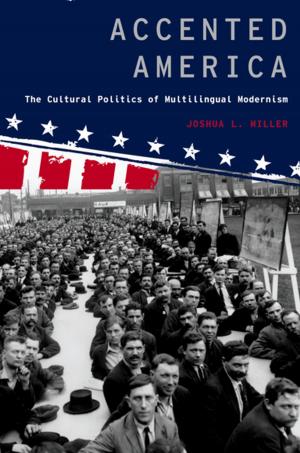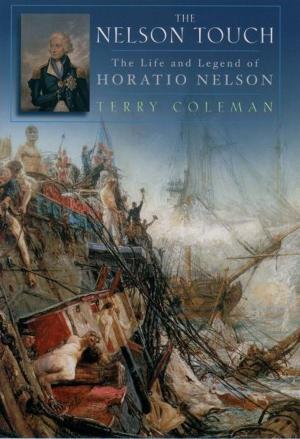Disruptive Power
The Crisis of the State in the Digital Age
Nonfiction, Science & Nature, Technology, Electronics, Digital, Social & Cultural Studies, Political Science, International, International Relations, Business & Finance, Industries & Professions, Industries| Author: | Taylor Owen | ISBN: | 9780199363889 |
| Publisher: | Oxford University Press | Publication: | March 2, 2015 |
| Imprint: | Oxford University Press | Language: | English |
| Author: | Taylor Owen |
| ISBN: | 9780199363889 |
| Publisher: | Oxford University Press |
| Publication: | March 2, 2015 |
| Imprint: | Oxford University Press |
| Language: | English |
Anonymous. WikiLeaks. The Syrian Electronic Army. Edward Snowden. Bitcoin. The Arab Spring. Digital communication technologies have thrust the calculus of global political power into a period of unprecedented complexity. In every aspect of international affairs, digitally enabled actors are changing the way the world works and disrupting the institutions that once held a monopoly on power. No area is immune: humanitarianism, war, diplomacy, finance, activism, or journalism. In each, the government departments, international organizations and corporations who for a century were in charge, are being challenged by a new breed of international actor. Online, networked and decentralized, these new actors are innovating, for both good and ill, in the austere world of foreign policy. They are representative of a wide range of 21st century global actors and a new form of 21st century power: disruptive power. In Disruptive Power, Taylor Owen provides a sweeping look at the way that digital technologies are shaking up the workings of the institutions that have traditionally controlled international affairs. The nation state system and the subsequent multinational system were founded on and have long functioned through a concentration of power in the state. Owen looks at the tools that a wide range of new actors are using to increasingly control international affairs, and how their rise changes the way we understand and act in the world. He considers the bar for success in international digital action and the negative consequences of a radically decentralized international system. What new institutions will be needed to moderate the new power structures and ensure accountability? And how can governments and corporations act to promote positive behavior in a world of disruptive innovation? Owen takes on these questions and more in this probing and sober look at the frontier of international affairs, in a world enabled by information technology and increasingly led by disruptive innovators. With cutting edge analysis of the fast-changing relationship between the declining state and increasingly powerful non-state actors, Disruptive Power is the essential road map for navigating a networked world.
Anonymous. WikiLeaks. The Syrian Electronic Army. Edward Snowden. Bitcoin. The Arab Spring. Digital communication technologies have thrust the calculus of global political power into a period of unprecedented complexity. In every aspect of international affairs, digitally enabled actors are changing the way the world works and disrupting the institutions that once held a monopoly on power. No area is immune: humanitarianism, war, diplomacy, finance, activism, or journalism. In each, the government departments, international organizations and corporations who for a century were in charge, are being challenged by a new breed of international actor. Online, networked and decentralized, these new actors are innovating, for both good and ill, in the austere world of foreign policy. They are representative of a wide range of 21st century global actors and a new form of 21st century power: disruptive power. In Disruptive Power, Taylor Owen provides a sweeping look at the way that digital technologies are shaking up the workings of the institutions that have traditionally controlled international affairs. The nation state system and the subsequent multinational system were founded on and have long functioned through a concentration of power in the state. Owen looks at the tools that a wide range of new actors are using to increasingly control international affairs, and how their rise changes the way we understand and act in the world. He considers the bar for success in international digital action and the negative consequences of a radically decentralized international system. What new institutions will be needed to moderate the new power structures and ensure accountability? And how can governments and corporations act to promote positive behavior in a world of disruptive innovation? Owen takes on these questions and more in this probing and sober look at the frontier of international affairs, in a world enabled by information technology and increasingly led by disruptive innovators. With cutting edge analysis of the fast-changing relationship between the declining state and increasingly powerful non-state actors, Disruptive Power is the essential road map for navigating a networked world.















